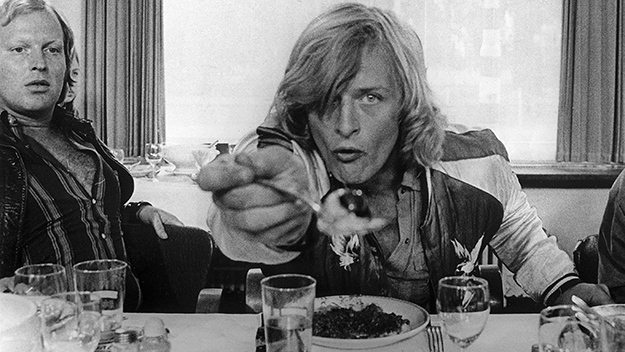News to Me: Rutger Hauer, Hirokazu Kore-eda, and Baumbach goes Barbie

Rutger Hauer in Turkish Delight (Paul Verhoeven, 1973)
1) Renowned Dutch actor Rutger Hauer passed away last week at the age of 75. The actor was famed for his intense, nuanced performances in Blade Runner, The Hitcher, The Legend of the Holy Drinker, and Nicolas Roeg’s Eureka, among countless others. In a 1990 Film Comment interview, Paul Verhoeven described his relationship with his frequent collaborator thusly: “I was looking at Soldier of Orange a couple of weeks ago—my kids were looking at it—and I was just looking at Rutger and I said, ‘Oh, fuck, he’s such a great guy! It’s so wonderful what he’s doing there. It’s so well done.’ And I could express myself so wonderfully via Rutger. He was like an alter ego for me.”
2) Hirokazu Kore-eda’s The Truth will open the Venice Film Festival in one month’s time. The director of last year’s Palme d’Or winner Shoplifters joins forces with modern French cinema royalty, Catherine Deneuve and Juliette Binoche, appearing together for the first time as a mother-daughter duo whose reunion sparks a collision of memories and confessions.
3) In other festival news, Josh and Benny Safdie’s long-awaited Uncut Gems will be in the lineup at this fall’s Toronto International Film Festival. It’s the story of a jeweler whose next job edges him into high-stakes, fast-paced chaos. The return to Good Time’s mean-streets New York setting features R&B star The Weeknd and the protean Adam Sandler taking on a role more in keeping with his acclaimed turns in Punch-Drunk Love and The Meyerowitz Stories than with his recent work in, say, Murder Mystery. TIFF artistic director Cameron Bailey gives the hard sell to IndieWire, declaring, “It’s cranked up to 11 the whole time, it’s exhilarating to watch, Adam Sandler gives his very best performance since Punch-Drunk Love and Kevin Garnett is in it, so it’s got something for everybody.”
4) Newsweek reports on an interesting trend for motorized moviegoers: showing feature films on unused billboards. Over the next month, A24 will screen a series of their recent art-house hits, including Lady Bird and Moonlight, on empty advertising space around the country. The distributor is calling the stunt #A24PublicAccess and more info, including GPS coordinates and screening times, can be found on their Twitter feed.
5) Over at Hyperallergic, frequent FC contributor Ela Bittencourt considers the Academy Film Archive’s restoration of Barbara Hammer’s trailblazing body of work. Preservationist Mark Toscano and programmer KJ Relth curated Barbara Hammer: Superdyke, which screens through July 28 at the Museum of the Moving Image after its Los Angeles run last year. “I am normally more conservative with restoration choices,” Toscano tells Bittencourt, “but with Barbara, I knew that she wanted her work to be fully immersive, to really convey the ecstasy of being alive in the world.”
6) Per The Hollywood Reporter, creative couple Greta Gerwig and Noah Baumbach are set to write a live-action Barbie picture with Warner Bros., with Margot Robbie in the starring role. At Little White Lies, Charles Bramesco looks at both sides of the coin: “Best-case scenario, they make the multiplex a more interesting place to be for a few weeks, but even in the worst-case, they’ve funneled enough money from the studio accounts into their personal coffers to fund their own endeavors moving forward.”
7) Le Monde has published an update on the hunt for Orson Welles’s fabled original cut of The Magnificent Ambersons, purportedly destroyed by RKO pictures in 1942. In a recent entry of his Queer & Now & Then column, Michael Koreseky writes that “The Magnificent Ambersons is a bit of a queer object in itself, its production woes exemplifying Hollywood’s essential fear and conservatism, and a victim of unapproved cutting that has found its strength and voice over subsequent decades.”
8) Cinephilia & Beyond has posted a facsimile of L.M. Kit Carson, Sam Shepard, and Wim Wenders’s continuity screenplay for Paris, Texas, which will screen as part of Film at Lincoln Center’s upcoming series Another Country: Outsider Visions of America. In a 1984 essay, Wenders writes that, “For me, this film has come off better than, or differently from, my previous films. Once more, we flew all night without instruments, but this time we landed exactly where we meant to.”
9) FC contributor Lawrence Garcia writes at MUBI Notebook about the pedagogical aspects of the filmmaking practice of Abbas Kiarostami (the subject of an ongoing retrospective at IFC Center). Garcia notes that “to emphasize the play impulse inherent in Kiarostami’s films is not at all to label them as trifles—and in fact it is the director’s recognition of the fundamental seriousness of play that provides his films with their peculiar, animating tensions.”
10) Finally, we belatedly note the passing of Milos Stehlik, co-founder of Facets Multi-Media. Stehlik, who died of cancer on July 6 at his Chicago home, was 70. Film at Lincoln Center’s Ray Privett has passed along this brief tribute: “Founded in 1975 as a collaboration between Stehlik’s film series and Nicole Dreiske’s theater troupe, Facets evolved to include a cinematheque, a video store, a video supplier, a video label, and a children’s film festival. The theater troupe separated from the organization, as did Dreiske, who married and divorced Stehlik. Born outside Prague after the war, Stehlik passed his early years under the Soviet eclipse of Czechoslovakia. Eventually, he and his mother followed his father—who had been in Germany when the border closed—across three continents. They settled together in Chicago. Economic opportunity and Stehlik’s relentless film research—often tied to curiosity about his origins—prompted Facets’ expansion into home video. By the early ’00s, Facets’ catalog of 50,000-plus titles was one of the great wonders of the film world.”
We leave you this week with a treat for fans of Hayao Miyazaki and Studio Ghibli: a Spotify playlist, with all the magic in one place:







